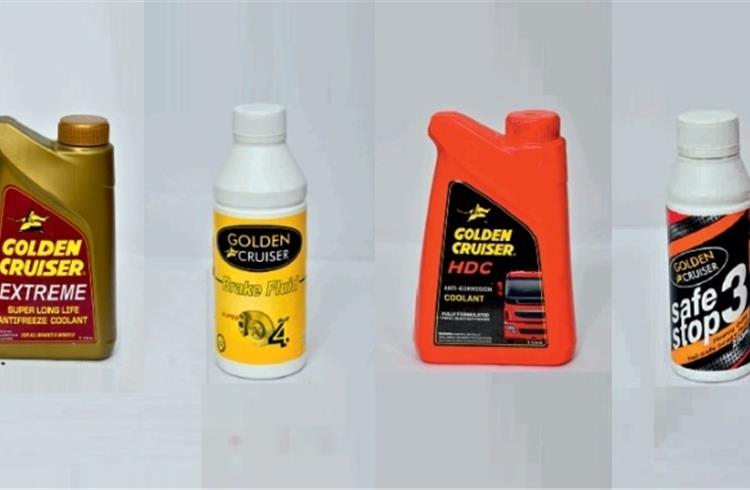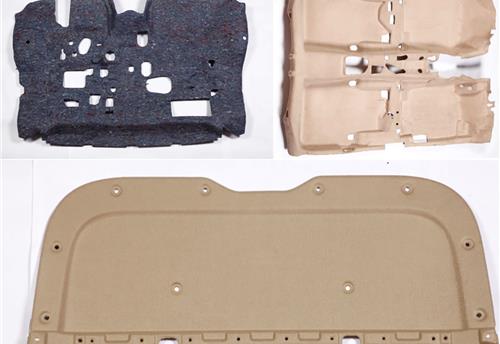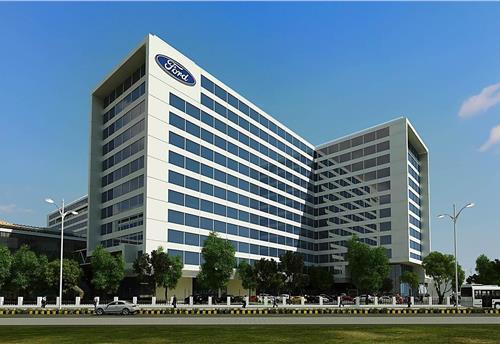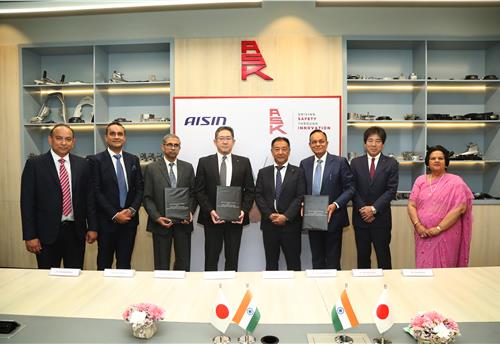S-CCI Golden Cruiser to introduce diesel exhaust fluids in India
The Indo-Japanese JV, which manufactures engine coolants, brake fluids and speciality chemicals, is set to start production of diesel exhaust fluid which helps reduce pollutants from vehicle emissions.
As pollution levels rise in several Indian cities, the spotlight is firmly upon diesel vehicles which have recently received a new lease of life with the ban in Delhi-NCR being called off.
Nevertheless, manufacturers of diesel-engined vehicles are exploring various ways to cut down on emissions. One such tech solution is that of using diesel exhaust fluid (DEF) with Selective Catalytic Reduction (SCR) technology.
This is an advanced emissions control technology that involves injecting a liquid-reductant agent, in this case DEF, through a special catalyst into the exhaust stream of a diesel engine. The DEF sets off a chemical reaction that converts nitrogen oxide, which is harmful when let out in the atmosphere in its original form, into innocuous nitrogen, water and tiny amounts of carbon dioxide (CO2), and expelled through the vehicular tailpipe. SCR technology, according to reports, can achieve NOx reductions of up to 90 percent.
Definitely coming
S-CCI Golden Cruiser India plans to start production of DEF, a non-hazardous solution, which contains 32.5 percent urea and 67.5 percent de-ionised water, at its Bhiwadi plant in Rajasthan in another three months. Diesel vehicles come strapped with a special catalytic converter within which nitrous oxide is generated that is neutralized by DEF and converted into water and nitrogen to prevent the noxious gases from escaping into the atmosphere.
DEF, which has caught up in a big way with automakers in developed markets, has made its foray in India with BS-IV and is beginning to pick up steam especially in the heavy duty truck segment. Elaborating on how DEF operates, SK Singh, director, S-CCI Golden Cruiser India, says DEF is filled in a separate tank and goes straight to the catalytic converter through a pipe. For every 100 litres of diesel consumed by the vehicle, 2- 3 percent DEF is consumed.
Some truck makers in India have started using DEF in select models where it is pitted to find higher adoption compared to cars where it is yet to make a presence but over a period of time is expected to penetrate diesel cars.
It is believed that Tata Motors, Mahindra & Mahindra and MAN Trucks are using SCR technology in some of their M&HCVs and are the target customers for S-CCI.
S-CCI Golden Cruiser already supplies coolants to Tata Motors, Force Motors and MAN Trucks albeit supplies to Ashok Leyland have been discontinued. Hence, addressing their DEF needs will be a further extension of this OE-supplier relationship.
When it comes to BS-VI norms, automakers have twin options – Suzuki in Europe uses DEF in its models but is not doing so in Japan where it has made efficient so as to cut noxious gases. In India, Maruti is expected to take a call on the new SCR technology after talks with Suzuki Japan but some form of DEF is expected to be used in its future SUVs.
A constraint though is the inadequate infrastructure at the governmental end. In foreign markets, when a vehicle stops to tank up on diesel at a fuel station, the DEF tank filling is also available separately. This is because a diesel fuel nozzle cannot fit into the DEF tank opening.
In India, this process is being undertaken at the workshop or dealership level which is not so efficient. DEF is normally priced in the region of Rs 35-40 per litre. S-CCI Golden Cruiser is currently awaiting approval of quality certification of ISO 22241 for producing this high technology fluid.
Of the competition, Gulf Oil has introduced DEF in India under the AdBlue brand name. S-CCI is mulling an investment of about Rs 45 lakh in its Bhiwadi plant to produce DEF. The facility has a production capacity of 15,000kl per annum for coolants and 5,000kl for brake fluids and is utilising only 60 percent capacity. This leaves ample scope for adding another product line here to optimise capacity.
The company is targeting initial sales of 200,000 litres of DEF per month for trucks and buses. With the new product line, it has outlined a topline of Rs 300 crore in a year’s time from the current revenue of Rs 250 crore.
Tracing the company’s roots
In India, automotive coolants came in with the entry of Maruti Suzuki in the early 1980s as Indian car brands like Fiat and the iconic Ambassador did not utilise them. At the time modern engines maintained higher operating temperatures, which meant water was not suited for cooling them and Suzuki Japan evinced interest in fitting radiator coolants in the car. It was here that CCI Corp of Japan, now renamed CCI, which produced engine coolants and brake fluids created a new market. Sensing an opportunity in India for its products, it scouted around for an Indian partner and zeroed down on Gurgaon-based Sunstar.
The two firms inked a technical partnership in 1985, which morphed into a JV in 1999. While Sunstar holds 90 percent of the stake, CCI has the balance 10 percent with an option to hike it to 40 percent. The JV’s products are marketed under the Golden Cruiser brand name.
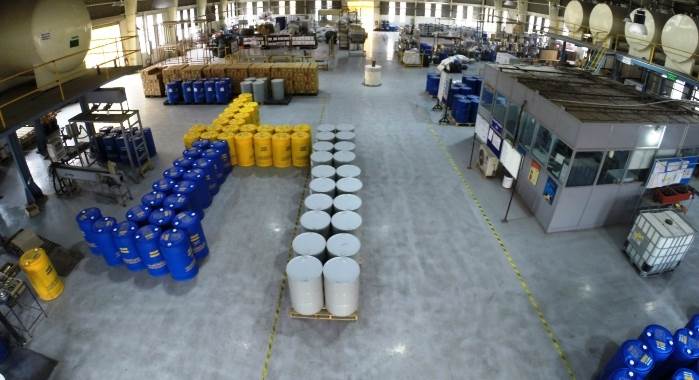
The company has factories at Bhiwadi, Rajasthan and at Sitargarh in Uttarakhand.
The JV, eventually known as S-CCI Golden Cruiser India, was formed basically to supply coolants and brake fluids to Maruti Suzuki, which was beginning to see growth. Over the years, other Japanese OEMs – Honda, Toyota, Nissan, Mitsubishi and Komatsu – also established their manufacturing footprint in the country and turned customers for the coolant company.
Headquartered at Gurgaon with factories at Bhiwadi and at Sitargarh in Uttarakhand, the latter to tap the excise exemptions offered in the state to manufacturing firms, the coolants company is on the cusp of expanding its product portfolio.
Well entrenched
S-CCI, which is a 100 percent supplier to Maruti Suzuki, Honda Cars India and Toyota Kirloskar Motor for coolants and brake fluids and holds about 70 percent share with Tata Motors, is well entrenched in the domestic market. “We introduced coolants for Tata Motors in the early 1990s and followed it up with Force Motors. We are not restricted only to the Japanese OEMs but are also associated with others. For instance, we are sole suppliers of brake fluids to Mercedes-Benz as well as all Ford models,” adds Singh.
Initially, the company imported coolants and brake fluids and subsequently localised some of them. However, some brake fluids continue to be imported as also assembly fluids used for coating brake parts to prevent rust and corrosion of brake fluids.
S-CCI later diversified into windshield washer fluids used for wipers and currently supplies the product to Toyota. Maruti Suzuki also uses it for its export models but other OEMs are yet to take to it as car owners in India prefer to use water. Nevertheless, awareness of washer fluids for windshields is growing. A key benefit is that it does not clog the wiper nozzles but cleans the windshield uniformly unlike water which is sprayed in different directions; neither does it leave mark traces on the windshield or affect the wiper blades. Water cleaning often leads to rusting of the metallic part of the wiper blades.
Meanwhile, the current trend is to increase coolant life in modern cars. In Honda cars, the latest super long-life coolant needs to be changed only after 10 or 11 years or after 200,000km. A top-off is required in between in case of a leakage or an accident. Toyota prefers to change its coolant after eight years. But in Hyundai and Maruti cars, a coolant change is advised after 2-3 years since they use the long-life coolant.
In trucks, the change periods vary between 200,000-300,000 kilometres with MAN Trucks changing the coolant over 500,000km. The change pattern with brake fluids is similar; earlier, these had to be changed frequently but are now being replaced after 2-4 years indicating an evolution in the brake fluid dynamics.
Coolant technology for hybrids and electrics is different as coolants, which have 12-14 chemicals embedded in them, are now made specifically to suit engine metallurgy. This is because electrics and hybrids have varied temperature requirements.
S-CCI’s R&D centre-cum-lab at Bhiwadi undertakes normal testing of products as well as analyses complaints from customers. In addition, it conducts research on increasing coolant life further. The company has a workforce of 300 people with four staffers deployed in the R&D centre including chemists. Technology is tapped from its Japanese collaborator.
Aftermarket business
Golden Cruiser products are also sold in the aftermarket in India although the company’s share has dwindled as being highly priced, they cannot compete with low-priced rival products.
In the OEM segment, S-CCI commands a 65-70 percent share with the aftermarket contributing 30-35 percent. Strong competition comes from Indian Oil, Gulf Oil and Valvoline with others including Mahle Filters and Gabriel of the Anand Group who have also entered the coolant business as a second product line.
The company has 125 distributors and maintains that growth is static as a number of car owners prefer to visit dealers or workshops, allowing them to choose a coolant or fluid. The company sells directly to some OEMs who disburse it to their dealerships. It also markets its products to other OEMs' distributors who in turn give it to company dealers. Exports go out to Bangladesh, Bhutan and Nepal; entry into the coolant aftermarket in Kenya and Nigeria is in the offing.
This article was first published in Autocar Professional's October 15, 2016, issue.
RELATED ARTICLES
Uniproducts India targets 15% growth till FY2027, eyes new EV OEMs for NVH parts
The Noida-headquartered company, which is a leading manufacturer of roof liners, floor carpets, sound insulation materia...
Ford to build more EV software capability at Chennai tech hub
Ford Business Solutions India, which currently employs 12,000 personnel set to add 3,000 more; Ford, which is known to b...
ASK Automotive to set up JV with Aisin to sell aftermarket parts for cars
Ask Automotive will have 51% of the equity of the joint venture to be set up with Aisin Asia (Thailand) Company and Aisi...





 By Shobha Mathur
By Shobha Mathur
 24 Oct 2016
24 Oct 2016
 22337 Views
22337 Views



